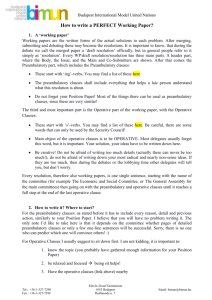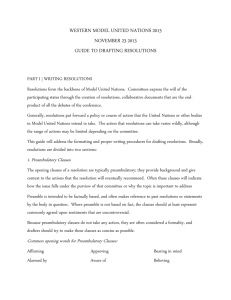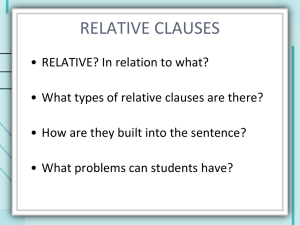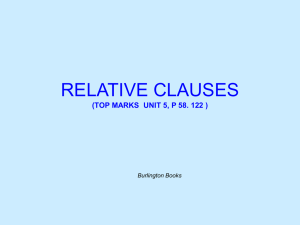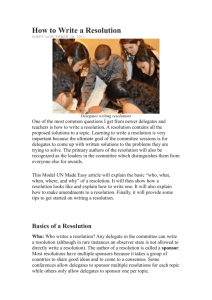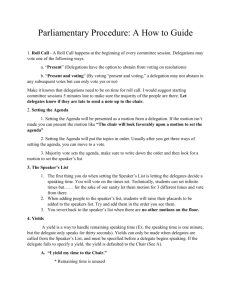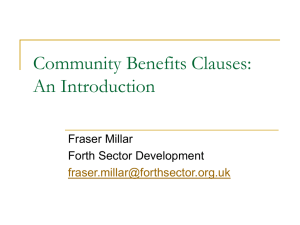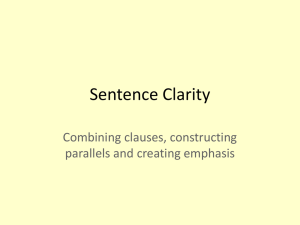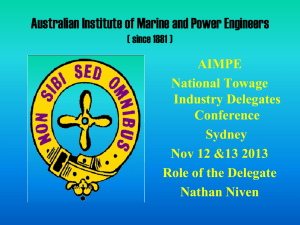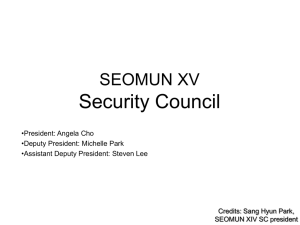ASGMUN TRAINING- DELEGATE GUIDE
advertisement
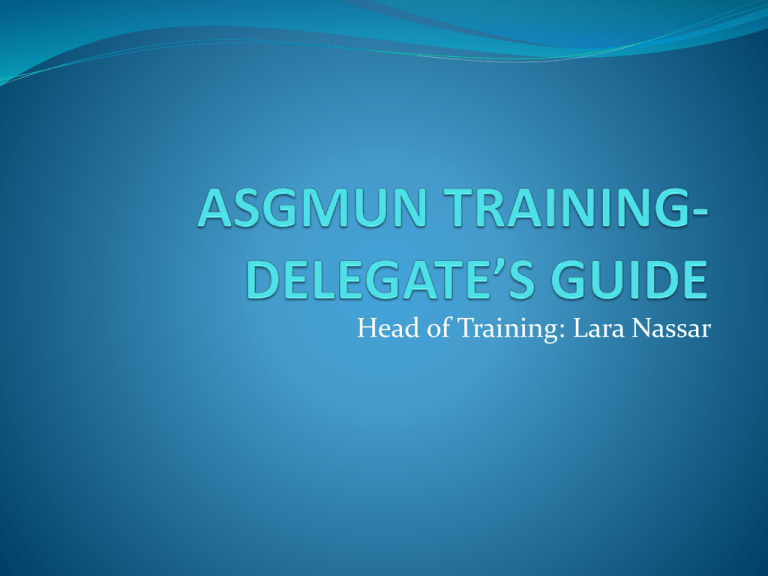
Head of Training: Lara Nassar The most important thing is RESEARCH The more you know about your topic, the more you can participate, and the more you participate the more you will enjoy MUN Bring resolutions written on your topics (if found) and bring them with you to the MUN Read newspapers, books articles on your topics, making notes of what you think will be helpful during debate Try to come up with your own ideas Find past UN resolutions on your topic, but DON’T copy Know the policies of important countries who are related to the topic.. So that you know if they go against their official policies Know and stick to your countries policy!!! Know your country’s allies and enimies Researching your country Make sure you know all of the following: Political Structure: Origin of political structure Constitution and Government Present stability and Policy Natural Resources Basic commodities produced Trade agreements Degree of self-sufficiency Cultural factors Ethnic groups Religions Cultural history Defense Military structure Dependency on other nations Membership of alliances Geography Bordering countries landscape Geopolitical considerations Views on world problems Role and influence in the world Membership of blocks and geopolitical groupings Economy Monetary system Dependency and debt Membership of economic and trade organizations History General last 50 years recent history Researching an organization The year it was established The location of the headquarters The organization’s purpose The type of organization (NGO, IGO..) Has your organization signed onto any documents? Which ones? Researching an issue Research the issue from the oldest information you find and work your way to the recent information Use articles and news sources to research your topic The UN Documents website will help you understand the issue better and how to resolve it Now that you’re done researching for your delegation and issue, you can start writing your resolution Resolutions aim at giving solutions to different issues Different countries take part in the writing of a resolution but the main contributor is the main submitter and rest are co-submitters Giving solutions which are just and don’t punish any specific sides are more likely to pass as they can appeal to more member states in the house Successful resolutions offer solutions to the various problems which contribute to the issue Three components in every resolution The Heading - Address the committee - State the issue being resolved - State main submitter and co-submitters Preambulatory Clauses - They describe what the issue is & state facts about it -Past and current situation - What has been done already regarding the issue Operative Clauses - Most important part of resolution - Explain what can be done to resolve an issue - Must contain sub clauses that explain your ideas and how they can be done SAMPLE RESOLUTION FORUM: Disarmament TOPIC: Bioterrorism SUBMITTED BY: South Africa CO-SUBMITTED BY: Brazil, India, Kazakhstan, Botswana, Namibia, Mozambique, Argentina, Egypt, Belgium, & Denmark Defining bioterrorism as the use of toxins or micro-organisms by a terrorist organization in order to secure a political end, Alarmed by reports of continued research into biological weaponry both by the governments of member states and freelance organizations, Concerned by the fact that almost all member states are insufficiently prepared for a biological attack on any scale and that in the event of such an attack casualties would be catastrophic, Recognizing the Convention on the prohibitions of the development, production and stockpiling of Bacteriological and Toxin Weapons and on their destruction (BTWC) as the most comprehensive existing convention on the subject of biological weapons 1. Further urges all member states to compile a list of personnel who would be required in the case of a terrorist attack, both to ensure that those affected are treated effectively and other necessary measures are taken; 2. Calls upon the UN secretariat to establish the United Nations Commission on Bioterrorism Preparation (UNCBP) which will work with organizations such as the WHO and the International Red Cross, the responsibilities of which will include, but not limited to, a. advising and aiding member states in the creation or improvement of public health infrastructure to include a surveillance network for early detection of a biological attack, identification, purchase, storage, and distribution of all necessary medical supplies needed in the case of a biological attack, b. The establishment and maintenance of a database, available to the governments of all member states of likely bioterrorism agents and information regarding symptoms, c. Providing expertise, and equipment to the less countries and those least able to finance such changes in an effort to improve their preparedness; 3. Proposes the formation of a new committee: the United Nations Committee for the Regulation of Biological Military Research and Shipment or UNCRBMRS who will convene to formulate a set of regulations to ensure that no state is creating unsafe biochemical weapons or transporting such things abroad; 4. Further Proposes that a Special Rapporteur and a team of experts on this subject to be appointed in order to ensure that all biological research facilitates within member states contain sufficient safety measures both to prevent the theft of biological weapons and the accidental detonation of biological weapons or their release into the atmosphere, also to ensure that the regulations decided upon by the UNCRBMS are followed by all member states 5. Recommends that all member states train essential personnel in order to identify and contain hazardous biological materials; 6. Requests that in the event of a bioterrorist attack all member states cooperate in terms of sharing resources and key personnel in order to lessen the effect of the attack; 7. Reinforces the need for global conferences to spread knowledge and expertise in order to redress the global imbalance in preparation 8. Further calls upon the health ministries of member states to a. Ensure that all physicians and medical practitioners are properly trained to identify and treat victims of biological attack and that all medical colleges include training and examination in these skills as a compulsory part of the majority of all medical course, b. Educate the general public on the danger of biological terrorism and the actions that should be taken in reaction to such an event, through such medias as the television and radio, or simply posters and by its introduction in a small way to school syllabi in countries where these mediums are unavailable c. Introduction of drills to prepare for biological attack to be regulated by the emergency services of member states who employ these drills; Resolution Do’s and Don’ts Heading: - Begin with “Forum indicating the committee - Continue with “Submitted by” to indicate who is the main speaker of the resolution - Follow this by “Co-submitted by” to illustrate those who’ve signed on to the resolution - Use the full official name of the delegations Preambulatory Clauses: - All preambulatory clauses must end in commas (,) - Leave a line between every clause - No clause opening words should be repeated in the resolution (if you need to reuse it use a similar word, or add “Further” before it or (with concern/ warning” - All clauses must be underlined and not numbered - All acronyms must be fully written out before appearing in the abbreviated form you only need to write them out once, after that refer to the in the abbreviated form for the rest of the resolution Operative clauses All acronyms must be fully written out before appearing in the abbreviated for All Operative clauses must be underlined and numbered Sub-clauses must be lettered (a), b), c), d)..) Sub-sub clauses must be in Roman Numerals (i)ii)iii)iv)..) If a sub-clause does not end the clause it must end in a comma (,) All operative clauses must end in semi-colons (;) Leave a line between every clause No clause opening words should be repeated In preambulatory clauses please DO State strong and recent facts about the issue Use statistics where applicable Mention the past and current situation Recall any passed resolutions by the UN on the issue Relate any organizations involved in the issue State relevant organizations’ efforts in the issue If applicable use developing or developed countries (MEDCs / LEDCs) In preambulatory clauses please DON’T Be too one sided or biased Use “third world countries”/ “poor countries”/ “first world countries”/ “rich countries” In operative clauses please DO Aim to find solutions which solve the smaller problems which contribute to the issue Elaborate on the solutions in your operative clauses (sub-clauses and sub-sub clauses) Make use of any UN organizations or create ones to help the issue Emphasize cooperation between governments and relevant UN organizations Explain different methods of approaching the same problem through clauses In operative clauses please DONT Break the sovereignty a government has over its land Mention specific sources and specific (numbers) amount of funding Be vague with your solutions or simply state a way of solving something without explaining ways of doing so Create unrealistic solutions to the issue which are vague or not possible IN ALL CLAUSES PLEASE DON’T PLAGIARIZE If you want to get ideas from resolutions only use similar ideas and rewrite them as your own Useful preambulatory clause starters Affirming Alarmed by Approving Bearing in mind Believing Confident Contemplating Convinced Declaring Deeply concerned Deeply conscious Deeply convinced Deeply Disturbed Deeply Regretting Desiring Emphasizing Observing Reaffirming Expecting Emphasizing Expecting Expressing it’s appreciation Fulfilling Fully aware Emphasizing Expecting Expressing it’s appreciation Fulfilling Fully aware Further deploring Further recalling Guided by Having adopted Having considered Having examined Having received Keeping in min Noting with deep concern Nothing with satisfaction Useful operative clause starters Accepts Affirms Approves Authorizes Calls Calls upon Condemns Confirms Congratulates Considers Declares accordingly Deplores Designates Draws the attention Emphasizes Encourages Endorses Expresses its appreciation Expresses its hope Further invites Deplores Designates Draws the attention Emphasizes Encourages Endorses Expresses its appreciation Expresses its hope Further invites Further proclaims Further reminds Further recommends Further requests Further resolves Has resolved Notes Proclaims Reaffirms Recommends Regrets Reminds Requests Solemnly affirms Strongly condemns Supports Takes note of Transmits Policy Statements/ Position Papers A policy statement is a speech written by delegates on the topic that appeals most to them It states the delegation’s feelings towards an issue and what they believe should be done in a brief manner What the delegation has already done regarding the issue and what they would like to do When researching you might not find enough information on your country’s policy. If that happens look into the policies of the country’s allies You probably will not be giving this speech but writing it or the info it contains will be useful: - to guide your research - to help you write your resolution/ opening speech - to organize your ideas regarding your country’s policy - to use it when you are unsure of what you want to say during debate Main components of a position paper Define and explain the issue Provide short summary of recent international action regarding the issue State the country’s general position on the issue Make suggestions of solutions that are in line with your country’s policy Sample policy statement Delegation: Forum: Issue: destruction Brazil Disarmament Commission Measures to prevent terrorists from acquiring weapons of mass Brazil fervently supports measures to support the Weapons of Mass Destruction Branch of the UN Office for Disarmament Affairs in its attempts to prevent terrorists from acquiring weapons of mass destruction (WMD), as it firmly believes such efforts are necessary to combat the global threat of terrorism. Brazil endorses the Outcome Document of the 2005 World Summit, adopted 13 September 2005, which condemns terrorism in all its forms and manifestations and strives to set up an international system that strictly monitors the transfer of materials that may be used to produce WMD. Brazil, one of the driving forces behind the 1967 Treaty of Tlatelolco, which turned Latin America into the world’s first nuclear-free zone, applauds the recent efforts made by the Members of the United Nations to free the world of any type of WMD. We feel especially responsible as our nation commands huge uranium resources. We view with satisfaction the recent efforts of Member States to prevent the use of WMD by terrorists. However, Brazil expresses its deepest regret that, in spite of recent efforts to combat the acquisition of WMD by terrorist groups, some countries have refused to abide by the will of the international community. It is our deepest interest to ensure a world untroubled by the transfer of WMD and materials that can be used in the production of any such weapons. Opening Speech The opening speech is delivered by each delegation on the second day of MUN, the first day of debate Begin your speech by addressing the president and the delegates .. “Honorable president, distinguished chair, and fellow delegates..” In the opening speech the delegate will show his/her position on one of the topics Sample opening speech Honorable President, Distinguished Delegates, France recognizes the need for multilateral efforts to achieve a greater balance in terms of development between the nations of the world. However, France also believes that any hope of achieving an acceptable economic balance in terms of global standards of living must take into consideration the environmental impact of such efforts. France applauds the recent changes in tone apparent in the North–South dialogue and calls for greater attention to be paid to the interrelatedness of development planning and environmental security. Environmental threats from industrialization must be eliminated from development planning. This is why France stands firmly behind the idea that aid and investment should occur at the local level, where traditional knowledge about the environment can play an important role in the development. Thank you, Mister President. Lobbying and Merging In lobbying and merging, you must group up with your allies You will merge your resolutions to come up with one ready resolution on every topic Writing an amendment An amendment is an improvement done to a resolution by striking it out, adding to it or removing part of it There will be official amendment sheets that you can send your amendments on You might be asked to come up and speak for your amendment so that it can be voted on How debate works Role call Resolution announced to be debated Main submitter called to the floor Main submitter reads operative clauses Main submitter makes a 3 minute speech about the resolution (why is it good? Main submitter answers points of information (questions) Main submitter yields the floor back to the chair or another delegate (“I yield the floor back to the chair”) Points There are different points in MUN which have different purposes Point of personal privilege Refers to the comfort of the delegate. For example: “Point of personal privilege! Can you open the window?” “Point of personal privilege! May the speaker raise their voice” Point of order used when there is a wrong fact stated by one of the delegates. You say “point of order! And then correct them” after they have finished speaking! Point of Parliamentary Enquiry Point of information to the Chair concerning rules of procedure. Example: “Could the Chair please explain to the house what is meant by closed debate?” A point CANNOT interrupt a speaker UNLESS it’s a point of personal privilege due to audibility (voice of speaker) Motions “Motion to move into voting procedure” It’s a request to stop debate and move directly into voting procedure Delegates can agree by saying “Seconds” It can be granted or denied by the chair Yielding Delegates can only yield once consecutively. One delegate can not take the floor, speak, then yield the floor to another delegate and then have them yield the floor to a third delegate. Clothing Formal clothing for both men and women Suit and tie for males Formal pants/ skirt with a formal shirt for females Useful links for research http://bestdelegate.com/research/ This link contains various other links that are helful in different areas of research for MUN
